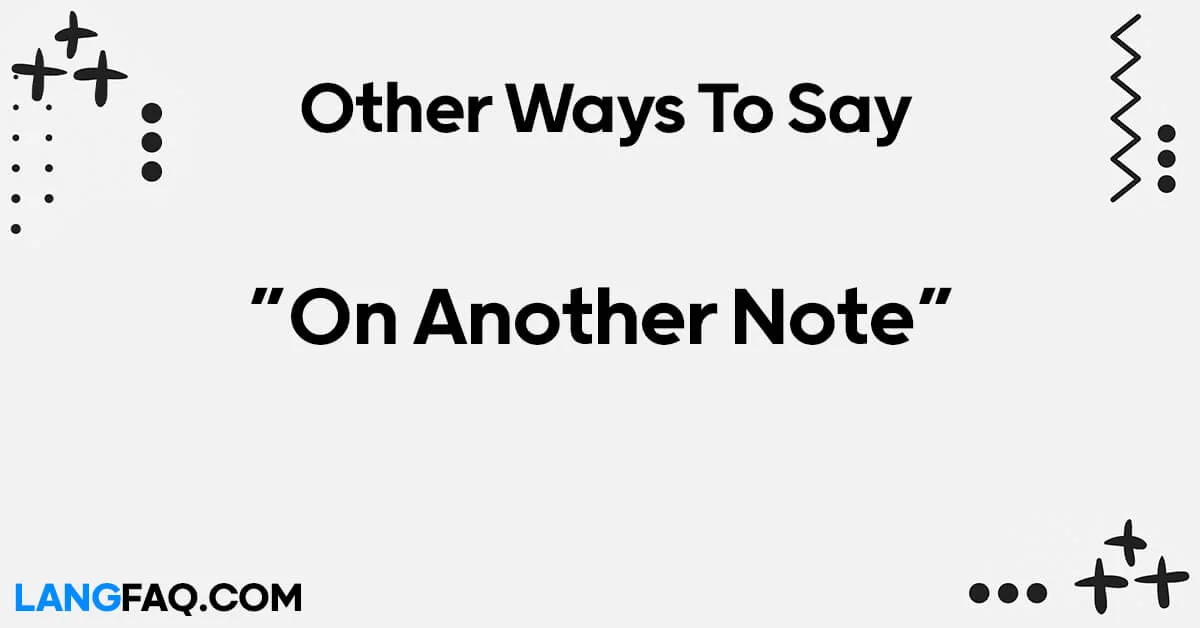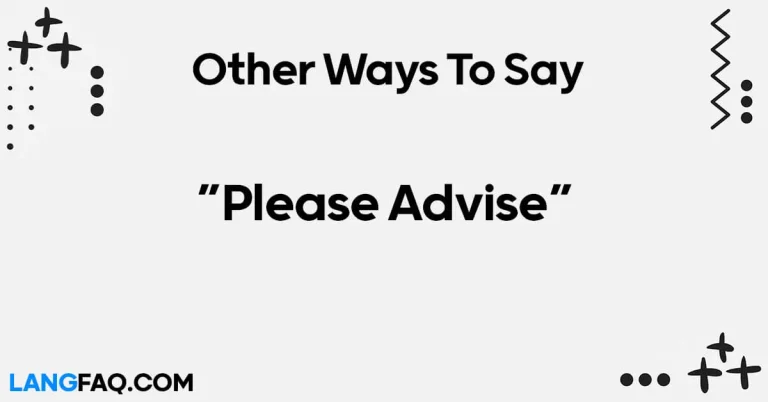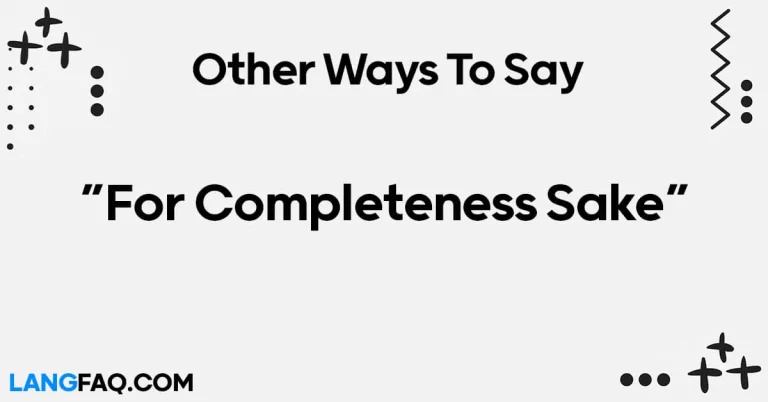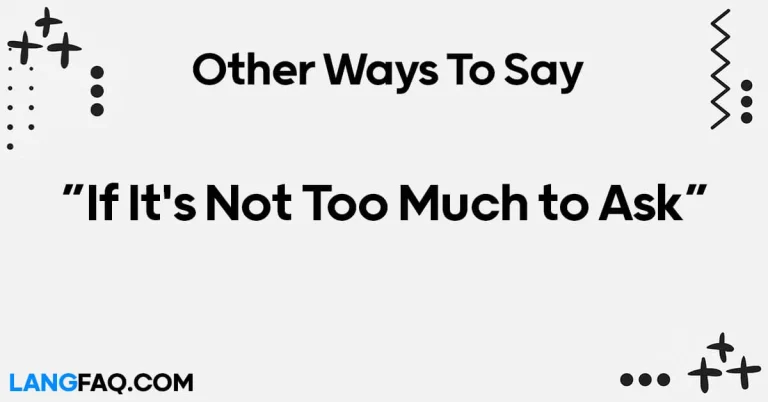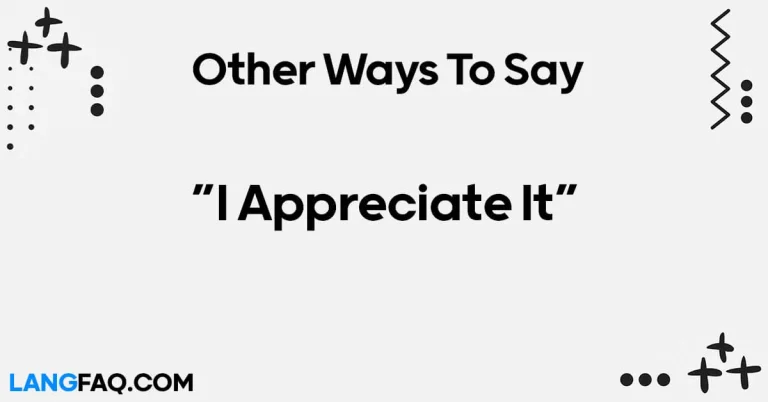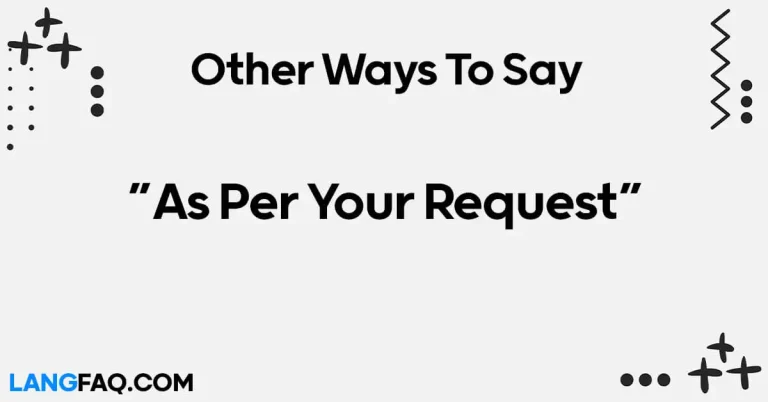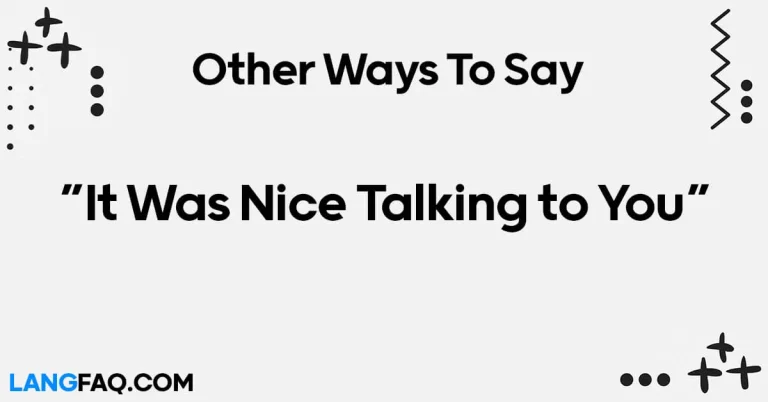In the world of communication, having a diverse vocabulary is like having a toolbox filled with various tools for different tasks. When it comes to expressing a change of topic or transitioning in a conversation, saying “on another note” might sound a bit repetitive. Fear not! This article will equip you with 12 refreshing alternatives to spice up your conversations and written communications.
12 Other Ways to Say “On Another Note”
Here are 12 other ways to say “On Another Note”:
- Incidentally
- By the way
- Speaking of which
- Moving on
- With that being said
- On a different note
- Moreover
- Furthermore
- In addition
- On a side note
- Just a heads up
- Before I forget
Here’s the table with meanings and examples for the 12 other ways to say “On Another Note”:
| Phrase | Meaning | Example |
|---|---|---|
| Incidentally | Used to introduce a minor point | Incidentally, I ran into your brother yesterday. |
| By the way | Introducing a related topic | By the way, have you seen the latest movie? |
| Speaking of which | Transitioning to a related topic | Speaking of which, did you finish your homework? |
| Moving on | Indicating a shift in conversation | We’ve discussed that enough, let’s move on. |
| With that being said | Transitioning to a new point | The weather looks great today. With that being said, let’s plan a picnic. |
| On a different note | Changing to a different topic | We were discussing work earlier. On a different note, how’s your family? |
| Moreover | Adding information | The project was completed on time. Moreover, it received excellent feedback. |
| Furthermore | Expanding on a previous point | The sales increased by 20% last quarter. Furthermore, our marketing efforts have been successful. |
| In addition | Adding more to what was said | She’s fluent in Spanish. In addition, she’s learning French. |
| On a side note | Adding an additional comment | The main course was delicious. On a side note, the dessert was outstanding too. |
| Just a heads up | Giving a warning or reminder | Just a heads up, the meeting has been rescheduled to tomorrow. |
| Before I forget | Reminding oneself to mention something | Before I forget, did you send the email to the client? |
Expanding your vocabulary to include these 12 alternative phrases for “On Another Note” not only adds variety to your language but also enhances your ability to communicate effectively in different contexts. By incorporating these phrases into your speech and writing, you can navigate conversations smoothly and engage your audience more effectively.
Is It Correct to Say “On Another Note”?
Yes, “On another note” is a correct and commonly used phrase in English. It is typically used to signify a transition to a different topic or to introduce a related but distinct point in a conversation or piece of writing.
Here are some contexts where “On another note” is appropriate:
- Transitioning Topics: When you want to change the subject of conversation, you can use “On another note” to smoothly transition to a different topic.Example: “We’ve discussed the budget for next quarter. On another note, has anyone heard about the new project proposal?”
- Introducing Additional Information: If you want to add an extra piece of information that is related to the current topic but not directly connected, “On another note” can be useful.Example: “The sales numbers for last month were impressive. On another note, our competitor just released a new product line.”
- Shifting Focus: When you want to redirect attention away from the current topic to something else, “On another note” can help refocus the conversation.Example: “We’ve covered the main agenda items for today’s meeting. On another note, I’d like to remind everyone about the upcoming team-building event.”
- Casual Conversations: In informal settings, such as chatting with friends or colleagues, “On another note” can be used to smoothly transition between topics.Example: “We’ve been talking about our favorite movies. On another note, has anyone tried the new restaurant downtown?”
Overall, “On another note” is a versatile phrase that can be used in various contexts to facilitate smooth transitions and introduce additional points of discussion. It adds fluidity to conversations and helps maintain engagement by diversifying the topics being discussed.
Professional Mail Example With “On Another Note”
Subject: Follow-Up on Project Discussion
Dear [Recipient],
I hope this email finds you well. I wanted to thank you for your insightful contributions during our project meeting earlier today. Your input was invaluable and will undoubtedly contribute to the success of our upcoming initiatives.
On another note, I wanted to address a specific point that was raised during the meeting regarding the project timeline. After further review, we’ve identified a potential bottleneck in the production phase that may impact our overall timeline.
To mitigate any delays, I’ve instructed the team to prioritize this aspect of the project and explore alternative solutions. Rest assured, we are committed to delivering results on schedule and will keep you updated on our progress.
Additionally, I wanted to remind everyone about the upcoming client presentation scheduled for next Friday. Preparation is key, so let’s ensure we’re all aligned on our messaging and deliverables.
If you have any questions or concerns in the meantime, please don’t hesitate to reach out. Your feedback is always welcome and appreciated.
Thank you for your continued dedication to our projects.
Best regards, [Your Name]
Incidentally: Adding a Minor Point
Incidentally is a versatile phrase that allows you to introduce a minor point or information into a conversation. It’s a subtle way to share additional details without derailing the main topic. Whether you’re in a formal meeting or a casual conversation, incidentally can smoothly integrate new information.
Formal Context: In a business meeting discussing project updates, you can use incidentally to mention a relevant statistic or detail that may have been overlooked.
Example Sentence: “Our sales have increased by 15% this quarter. Incidentally, our new marketing strategy seems to be paying off.”
Informal Context: During a friendly chat with colleagues, you can casually slip in an interesting fact using incidentally.
Dialogue Snippet: Colleague 1: “Did you hear about the new coffee shop that opened downtown?” Colleague 2: “Yes, I heard it’s quite popular. Incidentally, they also offer vegan pastries.”
Email Sample:
Subject: Project Update Meeting Follow-Up
Hi Team,
Thank you all for the productive discussion during yesterday’s meeting. I wanted to follow up with some additional insights. Incidentally, I came across a relevant industry report that I believe would complement our strategy. Please find it attached for your review.
Best regards, [Your Name]
Variations:
- By the way
- Speaking of which
By the Way: Introducing a Related Topic
By the way is a commonly used phrase to introduce a related topic or share a piece of information that may be of interest. It’s a casual yet effective way to transition smoothly between topics in conversation.
Formal Context: In a formal presentation or meeting, you can use by the way to introduce additional information or address a related point.
Example Sentence: “We’ve covered the main objectives of the project. By the way, I’d like to highlight the upcoming deadline for submissions.”
Informal Context: During a casual conversation with friends, by the way can be used to bring up a relevant topic or share an interesting fact.
Dialogue Snippet: Friend 1: “I’m planning a trip to Europe next summer.” Friend 2: “That sounds exciting! By the way, have you decided on your itinerary yet?”
Email Sample:
Subject: Quick Update
Hi [Name],
I hope this email finds you well. Just wanted to touch base on our upcoming team outing. By the way, I’ve attached a poll to gather everyone’s preferences for the venue. Please take a moment to vote.
Looking forward to hearing from you.
Best, [Your Name]
Variations:
- Speaking of which
- Moving on
Speaking of Which: Transitioning to a Related Topic
Speaking of which is a useful phrase for transitioning to a related topic or elaborating on a previous point in a conversation. It seamlessly connects ideas while maintaining the flow of discussion.
Formal Context: In a professional setting, speaking of which can be employed to draw attention to a relevant detail or segue into a related subject.
Example Sentence: “We’ve reviewed the budget for the upcoming project. Speaking of which, we need to allocate additional funds for marketing efforts.”
Informal Context: During a casual conversation among friends, speaking of which can be used to bring up a related topic or share a relevant anecdote.
Dialogue Snippet: Friend 1: “I heard you’re planning a trip to Japan.” Friend 2: “Yes, I’m excited to explore Tokyo! Speaking of which, do you have any recommendations for must-visit places?”
Email Sample:
Subject: Follow-Up on Meeting Discussion
Hi Team,
Thank you for the engaging discussion during yesterday’s meeting. Speaking of which, I’ve compiled a list of action items based on our deliberations. Please review the attached document and let me know if there are any additional tasks to add.
Best regards, [Your Name]
Variations:
- Moving on
- With that being said
Moving On: Indicating a Shift in Conversation
Moving on is a straightforward phrase used to signal a shift in conversation or redirect attention to a new topic. It’s a concise way to wrap up one point and transition to the next.
Formal Context: In a business meeting or presentation, moving on can be employed to smoothly transition between agenda items or discussion points.
Example Sentence: “We’ve addressed the challenges facing the marketing department. Moving on, let’s discuss potential solutions and action steps.”
Informal Context: During a friendly chat with colleagues, moving on can be used to steer the conversation towards a different topic of interest.
Dialogue Snippet: Colleague 1: “I heard you’re planning a team-building event.” Colleague 2: “Yes, we’re considering various options. Moving on, have you finalized the agenda for the next staff meeting?”
Email Sample:
Subject: Recap of Quarterly Review
Hi Team,
Thank you for your contributions during today’s quarterly review. Moving on, I’d like to highlight the key takeaways and action items moving forward. Please review the attached summary and let me know if there are any points that require further clarification.
Best regards, [Your Name]
Variations:
- With that being said
- On a different note
With That Being Said: Transitioning to a New Point
With that being said is a transitional phrase that signals a shift to a new point or topic in a conversation. It’s often used to summarize previous points and introduce fresh insights or perspectives.
Formal Context: In a formal setting such as a meeting or presentation, with that being said can be employed to transition smoothly between sections or to conclude one segment and introduce the next.
Example Sentence: “We’ve discussed the challenges facing our department. With that being said, let’s explore potential solutions and action steps moving forward.”
Informal Context: During a casual conversation among friends or colleagues, with that being said can be used to segue into a related topic or to introduce a new point of discussion.
Dialogue Snippet: Friend 1: “I’ve been thinking about redecorating my living room.” Friend 2: “That sounds like a fun project! With that being said, have you considered incorporating some vintage pieces for a retro vibe?”
Email Sample:
Subject: Recap of Weekly Team Meeting
Hi Team,
Thank you for your active participation in today’s team meeting. With that being said, I’d like to summarize the key action items and responsibilities moving forward. Please review the attached meeting minutes and let me know if there are any additional points to address.
Best regards, [Your Name]
Variations:
- On a different note
- Moreover
On a Different Note: Changing to a Different Topic
On a different note is a phrase used to transition to a different topic or subject of discussion. It’s a polite and effective way to shift focus without abruptly ending the current conversation.
Formal Context: In a professional setting such as a business meeting or conference, on a different note can be employed to smoothly transition between agenda items or to introduce a new point of discussion.
Example Sentence: “We’ve reviewed the quarterly financial reports. On a different note, let’s discuss the upcoming marketing campaign.”
Informal Context: During a casual conversation with friends or colleagues, on a different note can be used to steer the discussion towards a new topic of interest or relevance.
Dialogue Snippet: Colleague 1: “We’ve covered the project updates. On a different note, have you seen the latest episode of that new series?” Colleague 2: “No, I haven’t! Is it any good?”
Email Sample:
Subject: Change in Meeting Agenda
Hi Team,
Thank you for your flexibility. On a different note, I’d like to inform you of a change in the meeting agenda. We will be discussing the upcoming project timelines first, followed by budget allocations. Please review the updated agenda attached.
Best regards, [Your Name]
Variations:
- Incidentally
- By the way
Moreover: Adding Information
Moreover is a word that is used to introduce additional information or emphasize a point that has been made. It indicates that what is being said is in addition to what was already stated.
Formal Context: In a formal context such as a business presentation or report, moreover is commonly used to add weight to a statement or argument.
Example Sentence: “The company has seen a significant increase in profits this quarter. Moreover, our market share has also expanded.”
Informal Context: Even in informal conversations, moreover can be used to provide additional information or emphasize a point.
Dialogue Snippet: Friend 1: “I heard you got a promotion at work.” Friend 2: “Yes, I did! It comes with a higher salary and more responsibilities. Moreover, I’ll have the opportunity to travel for conferences.”
Email Sample:
Subject: Further Details on Project Proposal
Hi [Recipient],
Thank you for your interest in our project proposal. Moreover, I’d like to provide additional details regarding the implementation timeline and budget allocation. Please find the attached document for your review.
Best regards, [Your Name]
Variations:
- Furthermore
- In addition
Furthermore: Expanding on a Previous Point
Furthermore is a transitional word used to introduce additional information or to expand on a previous point. It’s often used to strengthen an argument or provide more evidence to support a claim.
Formal Context: In a formal setting such as a business meeting or academic presentation, furthermore can be employed to provide additional context or evidence to support a statement.
Example Sentence: “The initial results of our marketing campaign have been promising. Furthermore, customer feedback has been overwhelmingly positive.”
Informal Context: Even in informal conversations, furthermore can be used to provide additional information or elaborate on a point.
Dialogue Snippet: Friend 1: “I’m considering taking up a new hobby.” Friend 2: “That sounds like a great idea! Furthermore, it’s a great way to meet new people and relieve stress.”
Email Sample:
Subject: Follow-Up on Previous Discussion
Hi [Recipient],
Thank you for your input during our meeting yesterday. Furthermore, I’d like to address some of the concerns raised and provide clarification on our next steps. Please see the attached document for more details.
Best regards, [Your Name]
Variations:
- Moreover
- In addition
In Addition: Adding More to What Was Said
In addition is a phrase used to introduce something extra or to include more information or details on a topic that has already been mentioned. It is commonly used to expand on a point or provide further explanation.
Formal Context: In a formal setting such as a business presentation or report, in addition can be employed to introduce supplementary information or details.
Example Sentence: “Our company offers a comprehensive benefits package to employees. In addition, we provide opportunities for professional development and career advancement.”
Informal Context: Even in casual conversations, in addition can be used to provide more information or details on a topic.
Dialogue Snippet: Friend 1: “I’m thinking of redecorating my apartment.” Friend 2: “That sounds like a fun project! In addition, have you considered adding some indoor plants to bring in more greenery?”
Email Sample:
Subject: Additional Resources for Project Implementation
Hi [Recipient],
Thank you for your continued collaboration on our project. In addition, I’d like to share some additional resources and references that may be helpful for our implementation phase. Please see the attached document for more details.
Best regards, [Your Name]
Variations:
- Furthermore
- Moreover
On a Side Note: Adding an Additional Comment
On a side note is a phrase used to introduce an additional comment or piece of information that is related to the current topic but not essential to the main discussion. It is often used to share a related thought or observation.
Formal Context: In a formal setting such as a business meeting or presentation, on a side note can be employed to add a supplementary comment or observation.
Example Sentence: “We’ve covered the main agenda items for today’s meeting. On a side note, I’d like to remind everyone about the upcoming deadline for project submissions.”
Informal Context: Even in informal conversations, on a side note can be used to share an additional thought or observation related to the current topic.
Dialogue Snippet: Friend 1: “I heard you’re planning a vacation.” Friend 2: “Yes, I’m thinking of going to the beach. On a side note, have you ever been snorkeling?”
Email Sample:
Subject: Reminder About Meeting Agenda
Hi Team,
Thank you for your attention during today’s meeting. On a side note, I’d like to remind everyone about the upcoming team-building event. Please RSVP by the end of the week if you haven’t already done so.
Best regards, [Your Name]
Variations:
- By the way
- Just a heads up
Just a Heads Up: Giving a Warning or Reminder
Just a heads up is a phrase used to inform someone about something important or to give them a warning or reminder about a future event or situation. It is often used to share information in a casual and friendly manner.
Formal Context: In a professional setting such as a business meeting or email communication, just a heads up can be employed to give a warning or reminder about something important.
Example Sentence: “We’ve finalized the schedule for the conference. Just a heads up, the keynote speaker will be arriving an hour earlier than planned.”
Informal Context: Even in casual conversations, just a heads up can be used to inform someone about something important or to give them a friendly reminder.
Dialogue Snippet: Friend 1: “I’m planning to go hiking this weekend.” Friend 2: “That sounds like fun! Just a heads up, make sure to check the weather forecast before you go.”
Email Sample:
Subject: Reminder About Upcoming Deadline
Hi Team,
I hope this email finds you well. Just a heads up, the deadline for project submissions has been extended to next Friday. Please make sure to complete your tasks and submit them by then.
Best regards, [Your Name]
Variations:
- By the way
- On a side note
Before I Forget: Reminding Oneself to Mention Something
Before I forget is a phrase used to remind oneself to mention something that may be important or relevant to the current topic of conversation. It is often used to ensure that nothing is overlooked or forgotten.
Formal Context: In a professional setting such as a business meeting or presentation, before I forget can be employed to remind oneself to mention something important or relevant.
Example Sentence: “We’ve discussed the main agenda items for today’s meeting. Before I forget, I’d like to highlight the upcoming changes to our project timeline.”
Informal Context: Even in casual conversations, before I forget can be used to remind oneself to mention something important or relevant to the current topic.
Dialogue Snippet: Friend 1: “I heard you’re planning a trip to Europe.” Friend 2: “Yes, I’m looking forward to it. Before I forget, do you have any recommendations for places to visit?”
Email Sample:
Subject: Important Information Regarding Project Deadline
Hi Team,
I hope this email finds you well. Before I forget, I wanted to remind everyone about the upcoming deadline for project submissions. Please make sure to complete your tasks and submit them by the end of the week.
Best regards, [Your Name]
Variations:
- By the way
- Just a heads up
FAQs
Q: Can I use these phrases in formal settings? Absolutely! While some alternatives may be more casual, many of them are suitable for formal conversations, presentations, or writing.
Q: How can I remember to use these phrases in conversation? Practice makes perfect! Try incorporating these alternatives into your daily conversations or writing exercises to familiarize yourself with them.
Q: Are there any regional variations for these phrases? Yes, language can vary based on region and culture. Some phrases may be more commonly used in certain areas than others.
Q: Can I mix and match these phrases in a single conversation? Certainly! Mixing and matching these alternatives can keep your speech dynamic and engaging.
Q: Are there any phrases to avoid in professional settings? While most of these alternatives are suitable for professional settings, it’s essential to gauge the formality of the situation and choose accordingly.
Q: How can I practice using these alternatives effectively? Try role-playing scenarios or engaging in debates with friends or colleagues to practice incorporating these phrases naturally.
Conclusion
Expanding your vocabulary with alternative phrases for “on another note” not only adds richness to your language but also enhances your ability to express yourself effectively. By incorporating these alternatives into your conversations and writing, you’ll elevate your communication skills and leave a memorable impression on others.

